Websites of Georgian Courts, as a Reflection of Judiciary
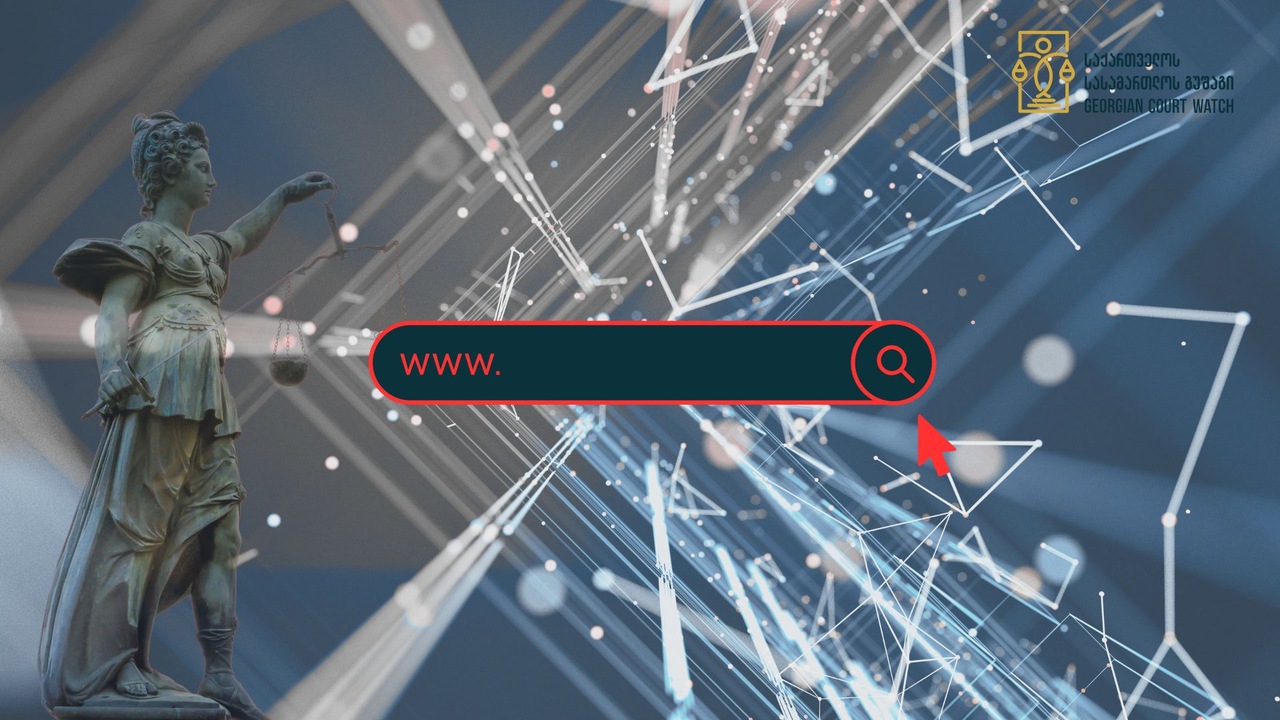
Against the fight for the office and strengthening of the influence, the role of judiciary focused on the needs of the individuals moves to the background. When high officials in the court serve to strengthen their own circle, providing high quality service to the citizens is not a priority for the system anymore. Good examples in this regard are the websites of the courts, which, normally aims to provide basic information to individuals, however, one cannot distinguish websites of the courts by this feature. At the same time, it shall be also mentioned that improving the websites does not require any legislative or big-scale reforms.
Access to the courts is an important pre-requisite for exercising the right to a fair trial (ECtHR, Golder v. the United Kingdom, 21/02/1975) – among them, in digital space, as digital access and technological development becomes more and more important. It is hard to find basic information on the websites of Georgian courts such as: court jurisdiction, court forms, court decisions, state duty rates, rules of execution/appealing court decision, etc. for more clarity, we will review the mentioned problems in detail, considering the relevancy of the topic.
Perceptibility, Responsiveness, Clarity and Strength of the Content
- Majority of the websites of Georgian courts are already quite old and dates to 2010, making content hard to perceive. Absence of relevant functions often results in the statistic data published on the website being hard to understand.
- In relation to operability of information, it is particularly problematic that often the link indicated on the website is difficult to open or does not open at all. Also, there are cases when information published on the website is significantly old. The news section has almost no updates on important matters in judiciary.
- In terms of understandability, the main drawback is that navigating the website and getting necessary information is quite difficult for the user, as information o softer published in the section thematically not related to the specific information.
- In terms of robustness, information published on the court websites is mostly written only in the language of the law, which may be hard to understand for a non-lawyer, at the same time, almost none of the sections of the websites are translated in other languages, making it hard for non-Georgian individuals to obtain necessary information. It should be also mentioned that voice mode is only available on the website of Tbilisi city court, however, it is quite hard and inconvenient for people with special needs to listen to it. Additionally, none of the websites of General Courts, except for Tbilisi and Kutaisi City courts have a mobile version, making it hard for the user to navigate from the phone.
Court Jurisdiction
Information on the jurisdiction published on the websites is mostly incomplete. In particular, the main problem is that none of the court websites have information about which court may judge a specific legal dispute (matter of substantive jurisdiction).
Court Location
The addresses of the courts are published on the websites, however, information on how to reach a specific court by public transport is missing.
Basic information important for the citizens prior to addressing the court
Prior to addressing the court, it is important for the citizen to know what rules to follow, what forms to submit or procedural topics to review. Access to court practice is also important for the citizen to know how similar disputes/cases are resolved. Several problems were highlighted on the websites of the General Courts of Georgia in this regard:
- Court forms approved by the High Council of Justice are not published on all the websites. On some of the websites the forms are accessible through the link. After following the link, the forms are available for downloading in Word format. However, there are cases when the link is broken, not all the forms are available in full format on the court website, or are published in irrelevant section;
- Court decisions are not proactively published on the website of the courts (with the exception of the Supreme Court of Georgia), as well as information which, according to the dispute category, would simplify proceedings for the customer without the help of a lawyer;
- In terms of publishing information of state duty fees and their calculation, the main problem is that the courts publish the link to the website created in 2010 and not updated since;
- The court websites do not have information on exemption from court costs, their reduction, postponement and distribution between the parties. Only the law on State duty Fees os published on the website of Rustavi City court;
- None of the court websites contain information on the ways of appealing and execution of court decisions. An information brochure on the rule of appealing and ways of execution of court decisions is published on the website of Tbilisi Court of Appeals, which dates to 2008 and does not comply with the active editions of legal acts.
It is interesting to review standards and examples from other countries on what type of information shall a court website contain, so that the users can get information they need while saving time.
Standards and Experiences of Other Countries
Guidelines (2016) of the European Commission for the Efficiency of Justice (CEPEJ) include indications on what type of information shall be published on the court website.
Regarding the access to the courthouse, CEPEJ mentions that “the public must be provided with information on access to the courthouse. It is helpful if the court website provides information for citizens on the location of the court, public transport links, opening hours, the layout of the courtrooms, times of hearings, etc.”
The European Commission for the Efficiency of Justice document also mentions that “the primary purpose of many websites created in recent years is to provide citizens with basic information before any dispute or legal proceeding begins. This information shall be accessible for them without leaving their houses, in a language understandable for them, and at the same time, it shall ensure them being informed on their rights and procedural steps.”
Additionally, Directive of the European Union (2016/2102) on the accessibility of the websites and mobile applications of public sector bodies indicate that the websites shall comply with the following four principles:
- Perceivability - information and user interface components must be easy to perceive and use for the users;
- Operability - interface and navigation must operate flawlessly;
- Understandability - information and the operation of the interface must be understandable for the user;
- Robustness - content must be robust enough to be interpreted reliably / understandably / correctly by a wide variety of user agents, including assistive technologies.
According to the directive, to ensure accessibility of the website, observation of the following characteristics is also important:
- Simple language;
- Video explanations;
- Regulation of colors and contrast;
- Regulation of font size;
- Alternative versions in grey and/or dark mode;
- Text without images.
The Kingdom of Netherlands
The website of the courts of the Kingdom of Netherlands provides information on the locations of the courts of all instances to the citizens. Information about what procedural issues and rules are related to the proceedings of the relevant court is also available on the website. These topics contain information on case proceeding, court expenses, court practice and possibility of mediation in different instances. The list of the courts redirects the user to the website of the relevant court.
On the homepage of the website of the courts, the user gets information on where the court is located and how to contact it, what are the working hours and what type of cases are within the jurisdiction of the specific court. Court decisions (briefs, as well as in detail) by date are also available on the website.
We also find the following sections on the website of the courts:
- Information for visitors;
- Attendance to the court proceeding;
- Court session;
- Rules and procedures;
- High-profile cases.
The website generates court forms taking into account the status of the user. Accordingly, it divides the users in three types: citizen organization and lawyer. By ticking the relevant box, the user undergoes identification process, enabling them to fill out the relevant form online.
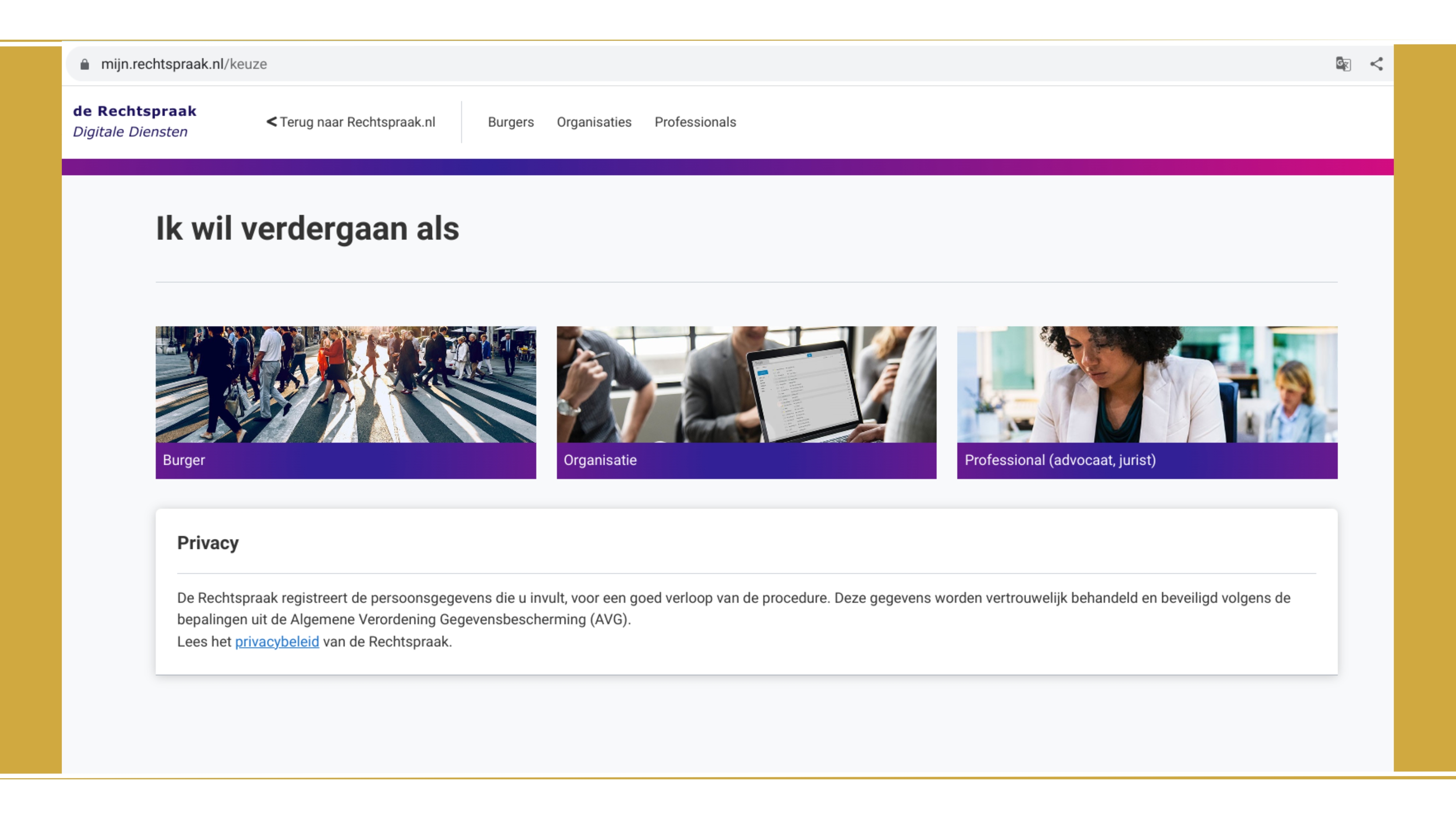
It is important to mention that, in terms of service accessibility, the court offers its users a mobile application to fill out the forms through, simplifying the process even more.
The United Kingdom
The Courts, tribunals and appeals section of the United Kingdom government website consists of various information fields uniting the following topics:
- How a citizen can access the court; what process a person shall undergo to testify; the website also has a link providing the user comprehensive information about the jury activities;
- Information on the court fees;
- Procedures to follow when a person does not have a lawyer;
Information on tribunals (tribunals mainly review administrative cases), criteria to follow when making a claim or statement to relevant tribunal. - The section also includes information on relevant court practice, which may have a certain importance for the user during the court proceedings;
- Appealing rules, which take into account the specifics of the decision of the relevant court/tribunal;
- Ways of legal dispute resolution when someone owes money to a person;
Information for the cases when a person complains against legal solicitor, judge, magistrate judge or a tribunal member.
It is important to mention that the website gives possibility to the users to express their opinion on the efficiency of a specific website they are using. Users can also describe a problem they faced on the website in detail.
When speaking of court accessibility, above all, it is important for the consumer to get information on which court/tribunal should hear their dispute. The UK government website gives possibility to the citizens, depending on their needs, to predefine which tribunal or court will hear their case.
The website is oriented as much as possible to adapt to the level of knowledge of the citizen and provide information accordingly. The first question a citizen needs to respond to is whether he knows the name of a court or tribunal which shall hear his case or not. Probable answers also take into account the interest of the citizen in case he wants the dispute to be considered by the court/tribunal that is territorially closest to him. Next questions cover the topics such as: why the citizen requires court services; on which topic he needs more information on. After marking the relevant answer, questions are more clarifying. If territorial proximity of the court/tribunal hearing the case is a priority for the citizen, after mentioning postal index, the website gives the list of the courts, which consider the case of the person interested in the issue, indicating the distance.
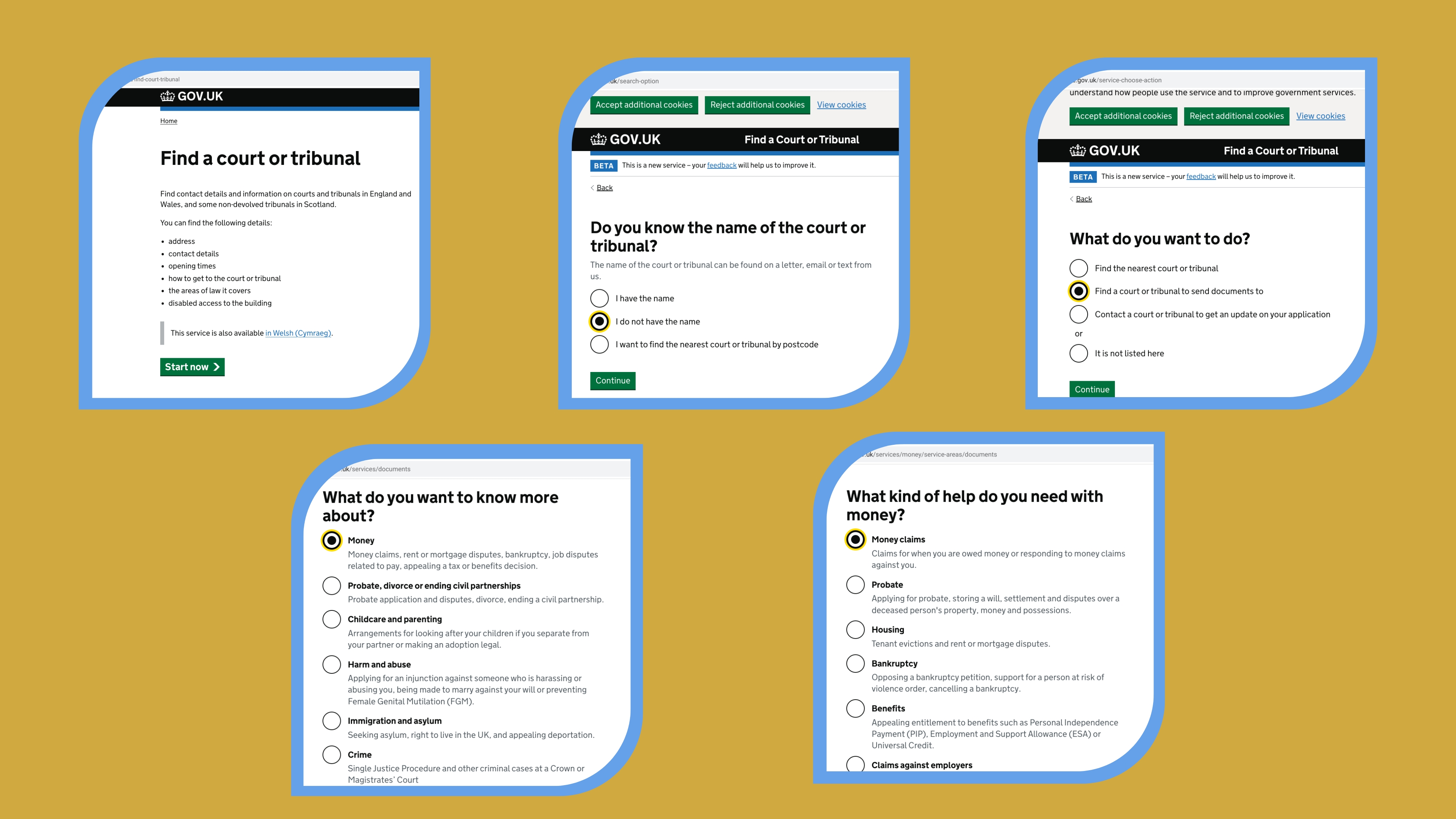
After choosing the preferred court, the user gets following information:
- Court location – the link to location, through which the user can get information about the public transport schedule to the court;
- Contact information – depending on the dispute specifics, website gives possibility to contact relevant court unit;
- Information on building accessibility – describing parking conditions and infrastructure for people with disabilities;
- Information on whether there is a children’s room, chapel, room with wi-fi, etc.
- It is important to mention that there is a separate phone number for people with disabilities;
- A separate link gives the user required information on interpretation/translation services.
The United States of America
In the United States, the courts website provides a person wishing to start the court proceeding with all important information, including court forms, legal aid, fees, translation services, etc.
The website also gives the user possibility to, by indicating the postal code, find the closest courthouse and plan the route to reach it.
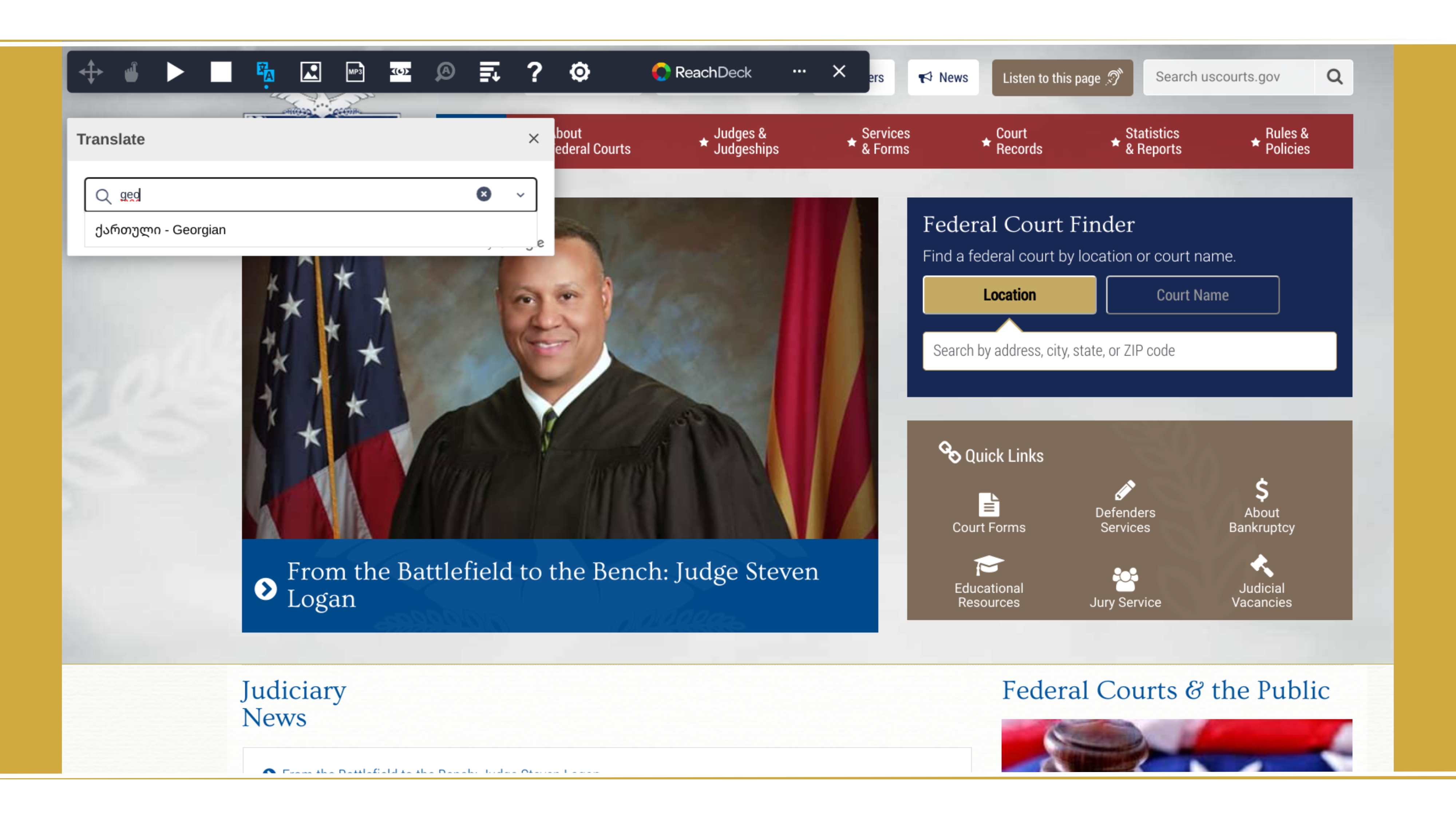
The USA courts website has one more significant feature, making it accessible for the wider society. More particularly, in a separate section on the website, a citizen can listen to the complete information that a specific page includes. Additionally, this section gives an option to translate the page in any language. The USA courts website supports judicial transparency standard by publishing court case recordings, statistics and information on vacant positions for judges. As the US is a big country and, at the same time is distinguished with its federal system characteristics, it is interesting to look into the quality of informativeness of individual state courts websites. With this purpose, Michigan state court website will be reviewed below in the article.
Michigan State
Michigan has developed a document Michigan Trial Court Standards and Guidelines for Websites and Social Media. According to the document, it is important for the Michigan court website to comply with the following major aspects:
- Accessibility – also includes a component of website accessibility for people with disabilities;
- Quality – refers to the accuracy of information published, publishing comprehensive information on court procedures and services;
- Transparency - involves publishing information about the work of the court, including accessibility of session acts, decisions and opinions online;
- Brand and design consistency – in order to improve visibility and increase trust, it is important for the website visual and logo design to be in harmony with court branding and created professionally;
- Mobile version – accessing the court website shall be possible from the screen of any size;
- User friendly navigation – refers to easily finding needed information by the users;
- Compliance with ethics and legal rules – compliance with the rules of confidentiality.
- Trainings and learning –courts shall case about provision of relevant trainings to persons responsible for the website management, in order to ensure website compliance with the guidelines.
As for the website of Michigan courts itself, along with the mentioned standards, it is also important to mention that the website gives possibility to the stakeholders to watch the court process live, significantly increasing the quality of transparency.
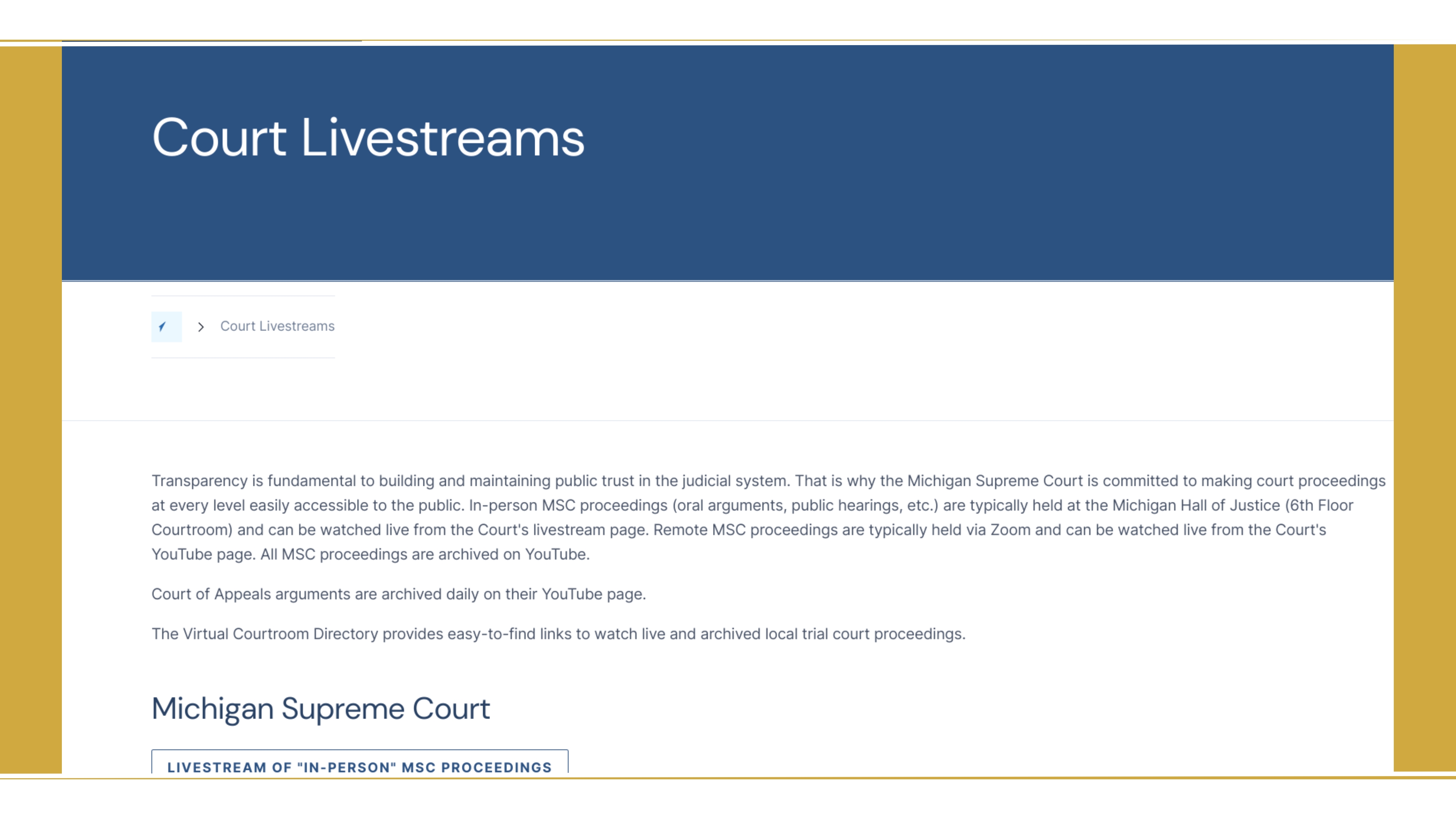
The website also contains video instruction, which makes court form easy to fill out online. Like the website of the courts od the Kingdom of the Netherlands, Michigan court website also gives information on which of the courts have jurisdiction over what types of disputes and how these jurisdictions apply.
Website gives opportunity to the citizens to proactively receive information and updates on Michigan judicial system on their emails.
Information on legal seminars, available to attend for all the stakeholders is also published on Michigan courts website.
Based on the above examples and international standards, we can conclude that the websites of Georgian General Courts do not meet the requirements envisaged by the quality of informativeness. therefore, it shall be important to our country to introduce website models which will make court services more accessible and perceivable for the customer.
-----
Materials published on Courtwatch.ge is a property of Georgian Court Watch and, when using them, “Georgian Court Watch” shall be indicated as a source.






























